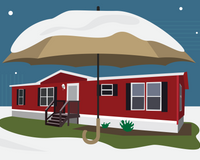This article was originally published on slate.com by Torie Bosch
What can mobile-home owners do to stay safe during a tornado?
Get out. So-called manufactured homes—dwellings built in factories and transported to their final destination—lack the structural support to keep residents safe during a tornado. In a well-built standard home, a basement or interior hallway can offer some protection during a catastrophic weather event. But the lightness that makes mobile homes easily transportable also means they aren’t sturdy enough to stand up to a tornado’s winds. As many as half of all tornado-related fatalities occur in mobile homes.
If you must be in a mobile home during a tornado, it’s best to stay in one that’s not so mobile. The safest manufactured home is one that’s anchored to a concrete foundation like a standard home. The next best thing to concrete is a semipermanent anchoring system that uses rods or chains to attach your trailer to beams that are driven into the ground. Anchoring can be difficult if the ground is hard and rocky, and if the soil is too soft then a powerful tornado could still rip your home from the earth. Even with anchoring, a mobile home can be damaged in a “weak” tornado (one with maximum wind speeds of 112 mph) that probably wouldn’t damage a standard house.
If your mobile home is on private property, another option is to install an underground tornado shelter made of concrete, steel, or fiberglass. These bomb-shelterlike structures cost anywhere from $2,500 to $10,000. It’s unlikely that you’ll be allowed to build an underground shelter if you live in a trailer park. Some parks do have community shelters that double as laundry rooms, community lounges, or management offices during the day. These rooms can be small, though, and often have glass windows, which can splinter during high winds.
Most mobile homes are made of lumber with metal or vinyl siding and metal or shingled roofs. There’s not much you can do to keep these materials from flying loose, but you can anchor down outdoor structures (like swing sets or sheds) to keep them from becoming flying weapons. It’s also a good idea not to store heavy objects on high shelves. You can use metal brackets to fasten furniture to the wall, and wires or cables to secure large objects like water heaters. Don’t think about boarding up windows at the last minute—you won’t have nearly enough advance warning to do the job.
It’s best to flee if at all possible. Community siren systems aren’t always effective—two alarms went off before Sunday’s tornado, but many residents said they didn’t hear them. Weather radios that broadcast warnings from the National Oceanic and Atmospheric Administration might be more effective. They work like alarm clocks, broadcasting a piercing warning tone if severe weather is imminent. On average, the National Weather Service can alert residents about 18 minutes before an anticipated tornado strike. That gives mobile-home owners time to evacuate to a shelter or a sturdier house nearby.






